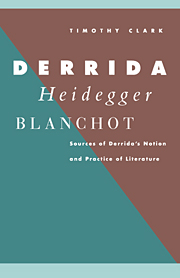4 - The event of signature: a ‘science’ of the singular?
Published online by Cambridge University Press: 15 August 2009
Summary
One major reference for Derrida's notion of littérature is the philosophy of science. Indeed there are three ways (at least) in which the literary may be said to embody a limit to forms of scientific representation. (1) As we have already seen, Derrida's littérature names a quasi-transcendental movement which thought must undergo in conceiving logic, objectivity or calculability. Moreover, insofar as it skews the structure of identification itself (whereby x is taken as x), it necessarily affects the pertinence of logic etc., and restricts their possible scope. Derrida's interest in Freudian psychoanalysis, for example, relates precisely to its relatively explicit entanglement in questions of representation, rendering it, willy-nilly, a ‘science’ of the borders of the scientific. (2) Recent attention in scientific theory to the issue of complexity has involved engagement with phenomena for which no explanation, in certain senses, can be forthcoming – these phenomena are so complex that any adequate model of them would have to be as complex as those phenomena themselves! Explanation in terms of some underlying equation or algorithm is debarred. This debate forms a suggestive context for Derrida's interest in the works of James Joyce, Finnegan's Wake (1939) in particular. Joyce's practice was to cultivate the greatest possible synchrony (or simultaneous mutual influence) between every fragment of his text, employing several languages at once in a programme that opens up a literary space of both minimal linearity and maximal resonance of signification.
- Type
- Chapter
- Information
- Derrida, Heidegger, BlanchotSources of Derrida's Notion and Practice of Literature, pp. 150 - 180Publisher: Cambridge University PressPrint publication year: 1992



